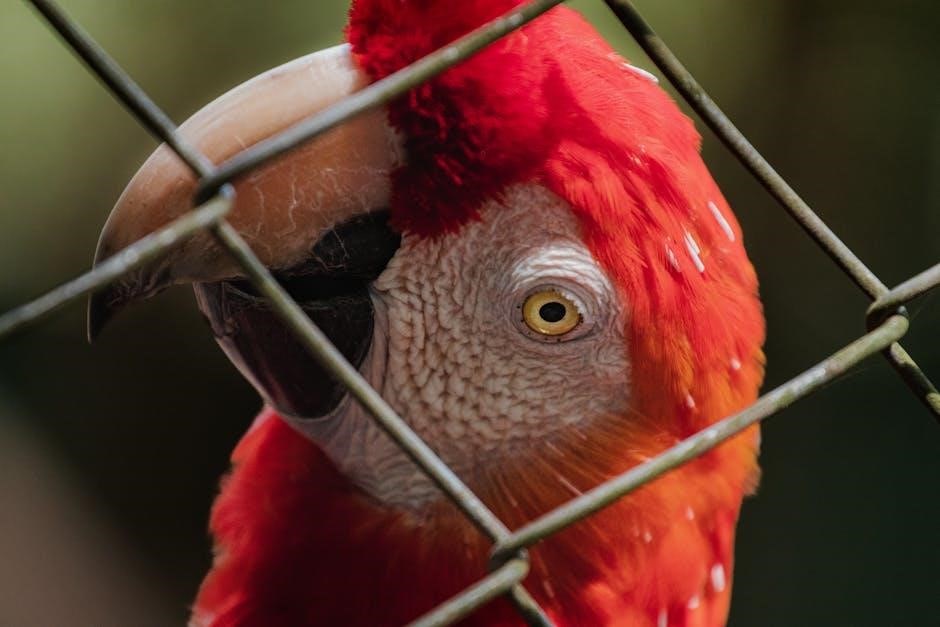A Veterinary Health Certificate is a legal document confirming an animal’s health and vaccination status, issued by accredited veterinarians, valid for a limited period, essential for pet travel.
1;1 Definition and Purpose
A Veterinary Health Certificate is an official document issued by a licensed veterinarian, confirming an animal’s health status, vaccination records, and fitness for travel. Its primary purpose is to ensure the animal meets destination country requirements, preventing the spread of diseases and ensuring safe transportation. It is essential for both domestic and international pet travel.
1.2 Importance for Traveling Pets
A Veterinary Health Certificate ensures compliance with destination regulations, preventing disease spread and verifying the pet’s health. It is a legal requirement for travel, safeguarding the pet’s well-being and ensuring a smooth journey. Without it, pets may face travel restrictions or quarantines, making it indispensable for responsible pet ownership and international or domestic relocation.
Requirements for Obtaining a Veterinary Health Certificate
Obtaining a Veterinary Health Certificate requires up-to-date vaccinations, health inspections, and lab tests as mandated by destination regulations, completed digitally by accredited veterinarians.
2.1 Necessary Documentation
The process requires specific documents, including proof of up-to-date vaccinations, health inspection reports, and lab test results. A completed certificate form, validated by an accredited veterinarian, is essential. Additional paperwork may include export permits and destination-specific forms. All documents must be digital and comply with the destination country’s regulations to ensure approval.
2.2 Role of Accredited Veterinarians
Accredited veterinarians play a crucial role by conducting health inspections and verifying vaccination records. They ensure the animal meets travel requirements and issue the certificate, confirming the pet’s fitness to travel. Their signature is legally required, and they must comply with destination country regulations to validate the document effectively.
2.3 Timeframe for Issuance
The certificate must be issued within a specific timeframe before travel, typically 10 days, as required by most airlines and destinations. The veterinarian verifies the animal’s health and ensures compliance with regulations. The timeframe varies by country, with some requiring issuance closer to the travel date to ensure the animal’s condition remains stable for the journey.

Destination-Specific Requirements
Destination-specific requirements vary, with international and domestic travel having distinct regulations. Some countries demand additional vaccinations or tests, ensuring compliance with local animal health standards.
3.1 International vs. Domestic Travel
Travel requirements differ significantly between international and domestic journeys. International travel often mandates stricter regulations, including specific vaccinations, health checks, and certifications, while domestic travel may require less documentation but still needs a valid health certificate.
3.2 Country-Specific Regulations
Each country imposes unique requirements for pet travel, including specific vaccinations, tests, and certifications. For example, the U.S. may require a USDA-accredited veterinarian’s endorsement, while the E.U. demands an up-to-date rabies vaccination. Researching the destination’s embassy or agricultural department is crucial to ensure compliance with all regulations before travel.
3.4 Vaccination and Testing Requirements
Specific vaccinations, such as rabies, are often mandated, with antibody titration tests required by some countries. Health examinations ensure pets are fit for travel, and documentation must reflect these requirements accurately to meet destination regulations.
Validity and Duration of the Certificate
The Veterinary Health Certificate is typically valid for a limited period, often 14 days from issuance, ensuring the pet’s health status is current for travel purposes.
4.1 Expiration Period
The Veterinary Health Certificate generally expires 14 days after issuance, ensuring the animal’s health status remains current for travel. Timing varies by destination, but most require certification within 10 days of departure to validate the pet’s fitness to travel internationally or domestically.
4.2 Renewal Process
The renewal process requires a new veterinary examination within the specified timeframe, ensuring the animal’s health remains verified for travel. The certificate must be reissued by an accredited veterinarian, following the same documentation and testing requirements as the initial issuance, to comply with destination regulations and ensure the pet’s eligibility for travel.

Information Included in the Certificate
The certificate includes essential details such as the animal’s identity, health status, vaccination records, and fitness for travel, ensuring compliance with destination regulations and safe transportation.
5.1 Animal Details
The certificate includes specific information about the animal, such as its name, species, age, sex, and breed. It also lists identification details like microchip numbers and a physical description. This ensures the animal’s identity is verified for travel purposes and aligns with destination country requirements.
- Name
- Species
- Age
- Sex
- Breed
- Microchip number
- Physical description
5.2 Health Status and Fitness to Travel
The certificate confirms the animal is free from infectious diseases and fit for travel. It includes a veterinarian’s assessment of overall health, absence of clinical signs of illness, and suitability for the journey. This ensures the animal can safely travel without posing health risks to others.
- Freedom from infectious diseases
- Clinical examination results
- Declaration of fitness for travel
5.3 Vaccination Records
The certificate includes detailed vaccination records, confirming the animal has received all required vaccines. It specifies types, dates, and expiration dates, ensuring compliance with destination regulations. Vaccinations must be up-to-date, with some countries requiring specific ones, such as rabies. This documentation is critical for international travel and must be verified by an accredited veterinarian.
- Types of vaccinations administered
- Dates and expiration details
- Compliance with destination requirements
Steps to Obtain the Certificate
Obtaining a Veterinary Health Certificate involves consulting an accredited veterinarian, undergoing necessary examinations, and completing the official form with accurate animal and health details for travel.
6.1 Consultation with a Veterinarian
A consultation with an accredited veterinarian is essential to discuss travel plans, ensure the animal’s health, and review vaccination records. The vet evaluates the pet’s fitness for travel, conducts a physical examination, and verifies compliance with destination requirements. This step ensures the certificate is issued accurately and legally, confirming the animal’s readiness for travel.
6.2 Required Examinations and Tests
Examinations and tests are conducted to ensure the animal is healthy and fit for travel. This includes a clinical evaluation, verification of vaccination records, and antibody titration tests if required by the destination country. Blood tests may also be necessary to confirm health status and compliance with specific regulations, ensuring the pet meets all travel criteria safely and legally.
6.3 Completing the Certificate Form
The form must be completed by an accredited veterinarian, ensuring all details are accurate. It includes animal identification, health status, vaccination records, and the destination country. The certificate is typically valid for a limited period, such as 14 days, and must be submitted digitally or in print, adhering to specific formatting requirements for international or domestic travel regulations.
Electronic Formats and PDF Availability
Many official websites offer downloadable PDF templates for veterinary health certificates, simplifying the process. These electronic formats ensure accuracy and compliance with regulatory requirements for pet travel documentation.
7.1 Downloadable Templates
Official websites, like www.cmvsf2.org, provide downloadable PDF templates for veterinary health certificates. These standardized forms ensure compliance with regulatory requirements, simplifying the certification process for pet owners; Templates must be completed using a text processor, as handwritten certificates are not accepted, ensuring clarity and professionalism in the documentation required for travel.
7.2 Digital Submission Processes
Many official portals now allow digital submission of veterinary health certificates, streamlining the process. Pet owners can upload completed PDF forms online, reducing paperwork. Digital signatures are accepted in most cases, enhancing efficiency and ensuring compliance with travel regulations. This modern approach aligns with regulatory requirements, making it easier to manage pet travel documentation.
Common Mistakes to Avoid
Common mistakes include missing the certificate’s expiration date, incomplete documentation, and incorrect digital submissions, which can delay travel plans and require costly revisions.
8.1 Timelines and Deadlines
The certificate is typically valid for 14 days from issuance, requiring owners to ensure it remains valid throughout their travel period. Missing deadlines can result in denied travel or additional costs, emphasizing the importance of timely veterinary consultations and accurate scheduling to avoid expiration issues during journeys.
8.2 Completeness of Documentation
Ensuring all sections of the certificate are fully completed is crucial. Incomplete details, such as missing vaccination records or health status, can delay or invalidate the document. Accurate and thorough documentation is essential to avoid issues during travel, emphasizing the need for careful review before submission.

Legal and Regulatory Implications
Non-compliance with health certificate requirements can lead to travel delays or denied entry. Ensuring all regulations are met is critical to avoid legal consequences.
9.1 Compliance with Authorities
Compliance with authorities ensures the certificate’s validity. Issued by accredited veterinarians, it confirms health status, vaccinations, and fitness to travel. Crucial for national and international trips, non-compliance risks entry denial or legal consequences.
9.2 Consequences of Non-Compliance
Non-compliance with health certificate requirements can result in entry denial, legal actions, or quarantine. Authorities may impose fines or require re-exportation. Ensuring all regulations are met is crucial to avoid travel disruptions and financial penalties, emphasizing the importance of proper certification processes and adherence to destination-specific rules.
Examples of Certificates for Different Countries
Examples of veterinary health certificates vary by country, with specific formats for the United States, European Union, and other regions. Templates are often available online, ensuring compliance with destination requirements.
10.1 United States
In the United States, the veterinary health certificate must be issued by a USDA-accredited veterinarian, ensuring compliance with import regulations. Templates are available on the USDA website, and the certificate must be signed and dated within a specific timeframe before travel. It is essential for both domestic and international travel, confirming the animal’s health and vaccination status.
10.2 European Union
The European Union requires a veterinary health certificate for pet travel, ensuring compliance with EU regulations. It must be issued by an accredited veterinarian, confirming the animal’s health and vaccination status, including rabies. The certificate is typically valid for 10 days before travel and must meet specific EU standards for both intra-EU and international travel.
10.3 Other Regions
For regions outside the EU and US, such as South America or Asia, specific health certificates are required. Chile and Argentina, for example, mandate a veterinary health certificate validated by local authorities. The document must confirm the animal’s vaccination status, particularly for rabies, and ensure compliance with destination regulations. Requirements vary by country, but most demand a certificate issued within 10 days of travel, ensuring the pet’s health and fitness for the journey. Digital formats are increasingly accepted, but original documents are often required for customs. It’s crucial to verify destination-specific rules to avoid entry issues, as regulations can be stringent and vary widely between countries. Always consult the embassy or consulate of the destination country to ensure all requirements are met, including any necessary endorsements or translations. This ensures a smooth travel experience for both the pet and the owner. Health examinations and vaccinations must be up-to-date, and the certificate must be signed by an accredited veterinarian. Additional tests, such as titulation of antibodies, may be required depending on the destination country’s regulations. The certificate is typically valid for a limited period, usually 14 days, and must accompany the pet during travel. Failure to present a valid certificate can result in denied entry or quarantine. Therefore, careful preparation and adherence to all requirements are essential to ensure compliance and a successful journey with your pet.

Additional Resources and Support
Official websites, veterinary associations, and travel agencies provide detailed guidance on obtaining and understanding health certificates. These resources offer templates, regulations, and professional assistance for pet travel preparation.
11.1 Official Websites
Official websites like www.cmvsf2.org and government agencies provide downloadable templates and detailed guidelines for health certificates. These platforms offer the latest regulations, ensuring compliance with international and domestic travel requirements. They also include country-specific details, making it easier for pet owners to prepare for their journeys with accurate and up-to-date information;
11.2 Veterinary Associations
Veterinary associations, such as the USDA-accredited veterinarians and local organizations like Ilustre Colegio Oficial de Veterinarios, provide essential resources and guidelines for health certificates. They ensure compliance with regulations and offer support for pet owners preparing for travel, including access to certified professionals and updated information on requirements.
11.3 Travel Agencies
Travel agencies often provide assistance with pet travel requirements, including guidance on obtaining a veterinary health certificate; They may offer downloadable templates or partner with accredited veterinarians to simplify the process. Agencies ensure pet owners meet destination-specific regulations, helping to avoid travel delays and ensuring compliance with health and documentation standards for a smooth journey.
A veterinary health certificate ensures your pet’s safe and legal travel, verifying their health and vaccination status. Always obtain it from an accredited veterinarian before your journey.
12.1 Final Checklist
Ensure your pet’s health certificate confirms their vaccination status, health condition, and fitness for travel. Verify the certificate’s expiration date, destination-specific requirements, and obtain it from an accredited veterinarian within the required timeframe. Double-check all details before submission to avoid delays.
12.2 Next Steps
Contact airlines or travel agencies to confirm pet travel policies. Submit the health certificate to the destination country’s consulate or embassy if required. Ensure all travel arrangements are finalized, including booking pet-friendly accommodations. Review and confirm the travel itinerary with your veterinarian. Stay informed about any last-minute travel restrictions or requirements.
